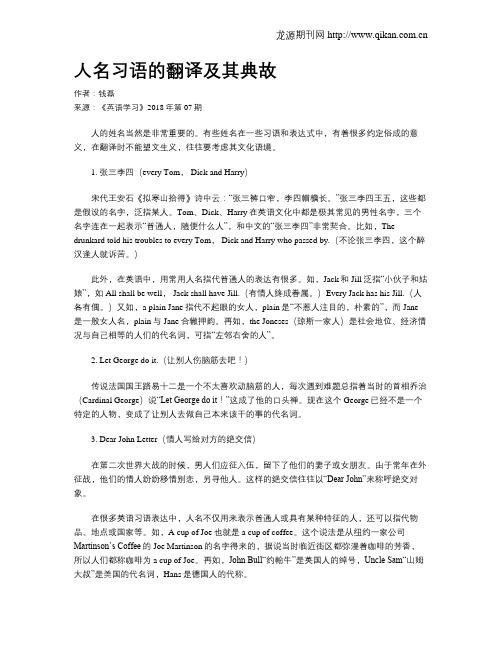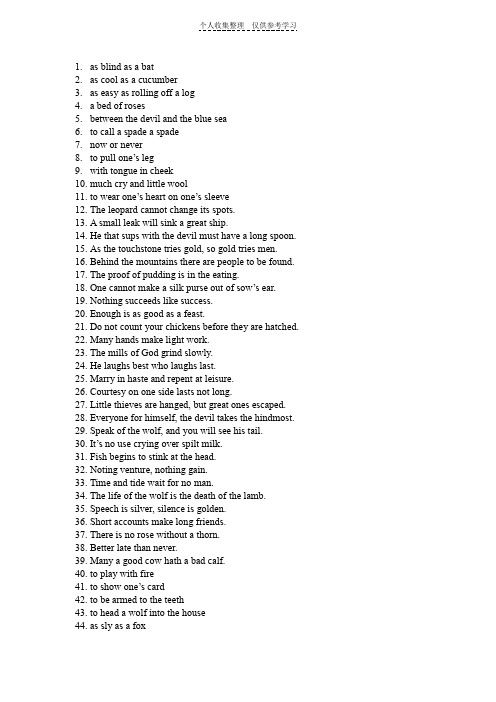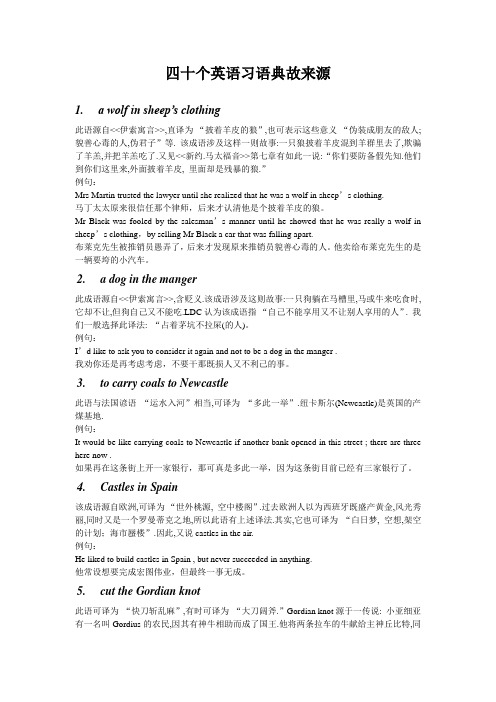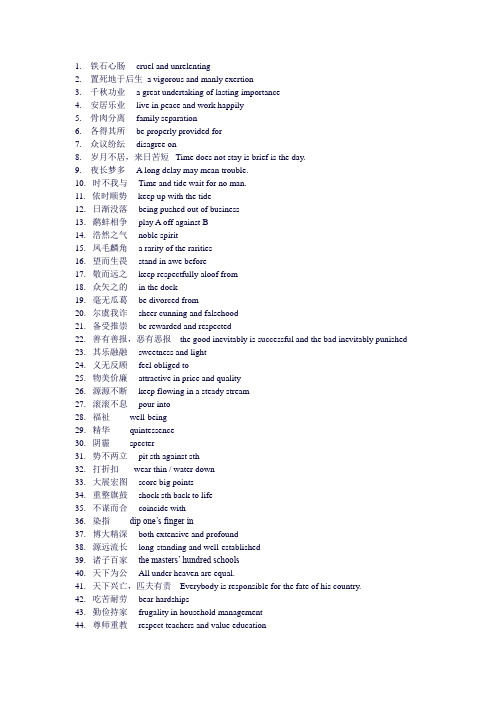20.英语习语和典故的翻译
英语习语小故事

一、have butterflies in one’s stomachDialogue:A: How are you today?B: I’m not very well. I don’t know why I’m having butterflies in my stomach these days.A: What’s wrong?B: I’m afraid I won’t pass this exam.A: Don’t worry.Word list:1. pass the exam 考试合格2. Don’t worry. 别担心。
have butterflies in one’s stomach 忐忑不安have butterflies in one’s stomach 的字面意思为“肚子里有几只蝴蝶”,意指“忐忑不安”或“紧张烦躁”。
二、up to one’s earsDialogue:A: Shall we go swimming this afternoon?B: I’m sorry I won’t. I have no time.A: Are you busy now?B: Yes. I’m up to my ears.Word list:busy 忙碌的up to one’s ears很忙,完全介入某件事的意思短语up to 表示“正在做着或忙于某事情”,而up to one’s ears 则表示“一直忙到耳朵根”,引申为“非常忙”。
三、three-bottle manDialogue:A: Yesterday Feng Feng was beaten by his father.B: Oh! His father is a three—bottle man.beaten: beat的过去分词打,揍得意思四、four squareDialogue:A:The boy is four square.B: He has not finish his homework.A: But he is four square. After a well, he isfinish it .finish: 完成after a well: 过了一会儿五、five-starDialogue:A: The little boy is five-star in the Class.B: Yes, he is diligent. He likes to study.He likes to help other students.diligent :勤劳的help: 帮助六、at sixes and sevensDialogue:A:On this Sunday, Jenny and her friends are playing games in Jenny’s home.B: Oh. What a mess.A: Yes. We made the room at sixes and sevens.made: 做的,导致七、In one's seventh heavenOn summer holiday, some parents bring their children to go to the beach. The children were in their seventh heaven,playing with water on the beach.in the seventh heaven: 七重天,极幸福八、A Couch PotatoDialogue:A: What do you like to do in your spare time?B: I like to play sports. My favourite sport is basketball.What do you like to do?A: I like to watch TV.B: How often do you watch TV?A: Every day. I usually watch forthree orfour hours.B: You're really a couch potato. You should do more exercise.习语注解:Word LIst: spare:(指时间)空暇的really:真正地九、A Big PotatoDialogue:John and Linda are looking at some photographs.Linda:Who is this man?John: Which man?Linda: This old man. He is sitting in the middle of the front row.John: He is the president of our company.Linda: Really? He's a big potato!习语注解:Word List: photograph:照片photo: 马铃薯,俗称土豆。
人名习语的翻译及其典故

人名习语的翻译及其典故作者:钱磊来源:《英语学习》2018年第07期人的姓名当然是非常重要的。
有些姓名在一些习语和表达式中,有着很多约定俗成的意义,在翻译时不能望文生义,往往要考虑其文化语境。
1. 张三李四(every Tom, Dick and Harry)宋代王安石《拟寒山拾得》诗中云:“张三裤口窄,李四帽檐长。
”张三李四王五,这些都是假设的名字,泛指某人。
Tom、Dick、Harry在英语文化中都是极其常见的男性名字,三个名字连在一起表示“普通人,随便什么人”,和中文的“张三李四”非常契合。
比如,The drunkard told his troubles to every Tom, Dick and Harry who passed by.(不论张三李四,这个醉汉逢人就诉苦。
)此外,在英语中,用常用人名指代普通人的表达有很多。
如,Jack和Jill泛指“小伙子和姑娘”,如All shall be well, Jack shall have Jill.(有情人终成眷属。
)Every Jack has his Jill.(人各有偶。
)又如,a plain Jane指代不起眼的女人,plain是“不惹人注目的,朴素的”,而Jane 是一般女人名,plain与Jane合辙押韵。
再如,the Joneses(琼斯一家人)是社会地位、经济情况与自己相等的人们的代名词,可指“左邻右舍的人”。
2. Let George do it.(让别人伤脑筋去吧!)传说法国国王路易十二是一个不太喜欢动脑筋的人,每次遇到难题总指着当时的首相乔治(Cardinal George)说“Let George do it!”这成了他的口头禅。
现在这个 George已经不是一个特定的人物,变成了让别人去做自己本来该干的事的代名词。
3. Dear John Letter(情人写给对方的绝交信)在第二次世界大战的时候,男人们应征入伍,留下了他们的妻子或女朋友。
英语习语汉译

1.as blind as a bat2.as cool as a cucumber3.as easy as rolling off a log4. a bed of roses5.between the devil and the blue sea6.to call a spade a spade7.now or never8.to pull one’s leg9.with tongue in cheek10.much cry and little wool11.to wear one’s heart on one’s sleeve12.The leopard cannot change its spots.13.A small leak will sink a great ship.14.He that sups with the devil must have a long spoon.15.As the touchstone tries gold, so gold tries men.16.Behind the mountains there are people to be found.17.The proof of pudding is in the eating.18.One cannot make a silk purse out of sow’s ear.19.Nothing succeeds like success.20.Enough is as good as a feast.21.Do not count your chickens before they are hatched.22.Many hands make light work.23.The mills of God grind slowly.24.He laughs best who laughs last.25.Marry in haste and repent at leisure.26.Courtesy on one side lasts not long.27.Little thieves are hanged, but great ones escaped.28.Everyone for himself, the devil takes the hindmost.29.Speak of the wolf, and you will see his tail.30.It’s no use crying over spilt milk.31.Fish begins to stink at the head.32.Noting venture, nothing gain.33.Time and tide wait for no man.34.The life of the wolf is the death of the lamb.35.Speech is silver, silence is golden.36.Short accounts make long friends.37.There is no rose without a thorn.38.Better late than never.39.Many a good cow hath a bad calf.40.to play with fire41.to show one’s card42.to be armed to the teeth43.to head a wolf into the house44.as sly as a fox45.An eye for an eye, a tooth for a tooth46.God helps those who help themselves.47.The spirit is willing but the flesh is weak.48.Birds of a feather flock together.49.Once bitten, twice shy.50.A stitch in time saves nine.51.Better be the head of a dog than the tail of a lion.52.Where there is a will, there is a way.53.to kill the goose that lays golden eggs54.Strike while the iron is hot.55.to fish in the air56.Don’t wash your dirty linen in public.57.All good things must come to an end.58.A fall in the pit, a gain in your wit.59.Hungry digs will eat dirty puddings.60.a fly on the wheel61.a bull in a china shop62.to paint the lily63.(an area) flowing with milk and honey64.by hook or crook65.to carry fire in one hand and water in the other66.Every dog has its day.67.make bricks without straw68.put one’s cards on the table69.to stick to one’s colors70.to tell the truth and shame the devil71.to thrust something down one’s throat72.After meat, mustard; after death, doctor.73.to separate the sheep from the goats74.to tread on one’s corns75.crying in the wilderness76.to pour oil on troubled waters77.Entertain an angel unawares.78.All is over but the shouting.79.All lay load on the willing horse.80.Anger and haste hinder good counsel.81.A word spoken is past recalling.82.World is but a little place, after all.83.What are the odds so long as you are happy.84.What you lose on the swings you get back on the roundabouts.85.to know the ropes86.in the same boat with87.Tit for tat.88.A friend in need is a friend indeed.89.easy come, easy go.90.First come, first served.91.Like father, like son.92.More haste, less speed.93.The greatest talkers are always least doers.94.a castle in the air95.behind the Eight-ball1.有眼无珠2.镇定自若3.易如反掌4.称心如意的境遇/安乐窝5.进退两难6.直言不讳7.机不可失;时不再来8.跟某人开玩笑/骗某人9.虚情假意地10.雷声大雨点小11.过于心直口快/过于直率12.江山易改,秉性难移13.千里之堤,溃于蚁穴14.和坏人打交道,必须提高警惕15.试金石试金,金子则考验人16.山外有山,天外有天17.实践出真知18.巧妇难为无米之炊19.一事成功,事事顺利20.知足常乐21.不要过早乐观22.人多好办事23.天网恢恢,疏而不漏24.谁笑在最后,谁笑得最好25.草率结婚后悔多26.单方面礼貌不会长久27.窃钩者诛,窃国者侯28.人不为己,天诛地灭29.说曹操,曹操到30.覆水难收31.上梁不正下梁歪32.不入虎穴,焉得虎子33.时不我待34.豺狼活,则羊羔死35.雄辩是银,沉默是金36.债务还得早,朋友交得长37.没有不带刺的玫瑰/ 没有尽善尽美的快乐38.迟到总比不到好39.好的父母未必培养出好的子女40.玩火41.摊牌42.武装到牙齿43.引狼入室44.像狐狸一样狡猾45.以血还血,以牙还牙46.自助者天助47.心有余而力不足48.物以类聚,人以群分/ 一丘之貉49.一朝被蛇咬,十年怕井绳50.小洞不补,大洞吃苦51.宁为鸡头,不为牛后52.有志者,事竟成53.杀鸡取卵54.趁热打铁55.缘木求鱼56.家丑不可外扬57.天下没有不散的筵席58.吃一堑,长一智59.饥不择食60.自以为有天大本事的人61.公牛闯进瓷器店,肆意捣乱62.为百合花上色,费力不讨好63.鱼米之乡64.不择手段65.施展两面手法66.人人皆有得意之日67.巧妇难为无米之炊68.摊牌69.坚持原则70.不顾忌别人,大胆说真话71.力图强迫别人接受意见72.雨后送伞73.区分好人与坏人74.伤害某人感情75.无人理睬的呼吁,警报或改革主张76.息事宁人77.有眼不识泰山78.大势已去79.人善被人欺,马善被人骑80.小不忍则乱大谋81.一言既出,驷马难追82.天涯原咫尺,何处不逢君83.知足者常乐84.失之东隅,收之桑榆85.内行86.与……境遇相同87.针锋相对88.患难见真情89.易得易失90.先到先招待91.有其父,必有其子92.欲速则不达93.语言的巨人总是行动的矮子94.空中楼阁95.走投无路96.。
四十个英语习语典故来源

四十个英语习语典故来源1. a wolf in sheep’s clothing此语源自<<伊索寓言>>,直译为“披着羊皮的狼”,也可表示这些意义“伪装成朋友的敌人;貌善心毒的人,伪君子”等. 该成语涉及这样一则故事:一只狼披着羊皮混到羊群里去了,欺骗了羊羔,并把羊羔吃了.又见<<新约.马太福音>>第七章有如此一说: “你们要防备假先知.他们到你们这里来,外面披着羊皮, 里面却是残暴的狼.”例句:Mrs Martin trusted the lawyer until she realized that he was a wolf in sheep’s clothing.马丁太太原来很信任那个律师,后来才认清他是个披着羊皮的狼。
Mr Black was fooled by the salesman’s manner until he showed that he was really a wolf in sheep’s clothing,by selling Mr Black a car that was falling apart.布莱克先生被推销员愚弄了,后来才发现原来推销员貌善心毒的人。
他卖给布莱克先生的是一辆要垮的小汽车。
2. a dog in the manger此成语源自<<伊索寓言>>,含贬义.该成语涉及这则故事:一只狗躺在马槽里,马或牛来吃食时,它却不让,但狗自己又不能吃.LDC认为该成语指“自己不能享用又不让别人享用的人”. 我们一般选择此译法: “占着茅坑不拉屎(的人)。
例句:I’d like to ask you to consider it again and not to be a dog in the manger .我劝你还是再考虑考虑,不要干那既损人又不利己的事。
3. to carry coals to Newcastle此语与法国谚语“运水入河”相当,可译为“多此一举”.纽卡斯尔(Newcastle)是英国的产煤基地.例句:It would be like carrying coals to Newcastle if another bank opened in this street ; there are three here now .如果再在这条街上开一家银行,那可真是多此一举,因为这条街目前已经有三家银行了。
(完整版)英语习语翻译

ugh in one’s face 当面嘲笑2. Lay something to heart 把某事放在心上3.Have pity on somebody 同情某人4.Trojan horse 特洛伊木马5.Sour grapes 酸葡萄6. Sphinx’s riddle 斯芬克思之谜7. A Juda’s kiss 犹大之吻8.hang on somebody’s lips 依赖某人,听凭某人做主9.to be full of beans 精神旺盛、尽精力充沛10.bend an ear to 聚精会神地听、洗耳恭听11.a skeleton at the feast 扫兴的人或物12.bury one’s head in the sand 采取鸵鸟政策13. burn the boat 破釜沉舟14. a bolt from the blue 青天霹雳15. six of one and half a dozen of the other 半斤八两16. one’s hair stand on end 毛发倒竖17. kill two birds with one stone 一石两鸟、一箭双雕18. kill the goose that lays the golden eggs 杀鸡取卵19. In the country of the blind the one-eyed man is king. 盲人之邦,独眼称王。
20. If you run after two hares, you will catch neither. 同时追两兔,全都抓不住。
21. It is an ill wind that blows nobody good. 对人人都有害的事,天下少有。
22. Every man has a fool in his sleeve. 人人都有糊涂的时候。
23. When Greek meets Greek, then comes the tug of war. 两雄相争,其斗必烈。
习语翻译

习语翻译1.Wet behind the ears. 乳臭未干2.It’s no use crying over spilt milk. 覆水难收3.Beauty is only skin deep. 有福同享,有难同当4.Every dog has his day. 绣花枕头5.To handle without gloves. 人人都有出头日6.A black sheep 害群之马7.Sheep without a shepherd 乌合之众8.Love me, love my dog. 爱屋及乌9.Ivory tower 象牙塔10.Sour grapes 酸葡萄11.Crocodile tears 鳄鱼的眼泪12.Black horse 黑马13.Time and tide wait for no man 岁月不待人14.Man has but one life, grass sees but one spring 人生一世,草生一春15. A wolf in a sheep’s clothing 披着羊皮的狼16.Where there’s smoke there’s fire. 无风不起浪17.Look before you leap 三思而后行18.Strike while the iron is hot. 趁热打铁19.More haste, less speed. 欲速则不达20.Practice makes perfect. 熟能生巧21.Well begun is half done. 良好的开端是成功的一半22.Look on with folded arms. 袖手旁观23.Misfortune never comes alone. 祸不单行。
英语50个常见成语习语翻译

1. 铁石心肠cruel and unrelenting2. 置死地于后生a vigorous and manly exertion3. 千秋功业 a great undertaking of lasting importance4. 安居乐业live in peace and work happily5. 骨肉分离family separation6. 各得其所be properly provided for7. 众议纷纭disagree on8. 岁月不居,来日苦短Time does not stay is brief is the day.9. 夜长梦多 A long delay may mean trouble.10. 时不我与Time and tide wait for no man.11. 依时顺势keep up with the tide12. 日渐没落being pushed out of business13. 鹬蚌相争play A off against B14. 浩然之气noble spirit15. 凤毛麟角 a rarity of the rarities16. 望而生畏stand in awe before17. 敬而远之keep respectfully aloof from18. 众矢之的in the dock19. 毫无瓜葛be divorced from20. 尔虞我诈sheer cunning and falsehood21. 备受推崇be rewarded and respected22. 善有善报,恶有恶报the good inevitably is successful and the bad inevitably punished23. 其乐融融sweetness and light24. 义无反顾feel obliged to25. 物美价廉attractive in price and quality26. 源源不断keep flowing in a steady stream27. 滚滚不息pour into28. 福祉well-being29. 精华quintessence30. 阴霾specter31. 势不两立pit sth against sth32. 打折扣wear thin / water down33. 大展宏图score big points34. 重整旗鼓shock sth back to life35. 不谋而合coincide with36. 染指dip one’s finger in37. 博大精深both extensive and profound38. 源远流长long-standing and well-established39. 诸子百家the masters’ hundred schools40. 天下为公All under heaven are equal.41. 天下兴亡,匹夫有责Everybody is responsible for the fate of his country.42. 吃苦耐劳bear hardships43. 勤俭持家frugality in household management44. 尊师重教respect teachers and value education45. 当务之急highest priority46. 遭受重创take a heavy toll47. 先见之明prescient move48. 奇园古宅exotic gardens and old mansions49. 衣食住行clothing, food, shelter and transportation50. 信誓旦旦be poised to。
英语典故加习语大全

1. [典故+习语]--读典故学英语,够有趣--开张大吉篇PIE IN THE SKY中国人常说“天上不会掉馅饼”,美国也有类似的说法--pie in the sky,形容不可能实现的事情。
下次如果有人跟你说“如果我有500万的话......”,你就可以说,“forget it, it's a pie in the sky”。
此短语直译为『天国(上)的馅饼』,源自美国流行作曲家、世界产业工人联盟的组织者Joe Hill 于1911年所作的一首着名歌曲《传教士与奴隶》。
他在歌中写道:You will eat, bye and bye,In the glorious land above the sky!Work and pray, live on hay,You'll get PIE IN THE SKY when you die!这几句歌词是Joe Hill 从美国救世军军歌中引用过来的,意在讽刺这个宗教组织,揭露其欺骗性和虚伪性,唤醒广大被压迫的奴隶。
后来人们就用pie in the sky 比喻『渺茫的希望』和『不能保证实现的允诺』等意思。
好,这次大家就翻译一下上面那两句歌词吧-------------------------------------------------------------------------------不久你将在天上的圣地就餐。
劳动吧!祈祷吧!靠干草过活吧!死后你就会得到天国的馅饼!2. [典故+习语]--读典故学英语,够有趣--(2)今天我们学习的是个很常见的习语RAIN CATS AND DOGS可能你已经知道了rain cats and dogs 的含意为『下倾盆大雨』,但你知道这个短语是怎样衍生而来的吗?下雨就下雨,怎可能从天上掉下来猫和狗呢?下雨同猫及狗又是怎样扯上关系的呢?原来,据说这个短语最早出现于17世纪,不过关于它的起源已经无从考证。
- 1、下载文档前请自行甄别文档内容的完整性,平台不提供额外的编辑、内容补充、找答案等附加服务。
- 2、"仅部分预览"的文档,不可在线预览部分如存在完整性等问题,可反馈申请退款(可完整预览的文档不适用该条件!)。
- 3、如文档侵犯您的权益,请联系客服反馈,我们会尽快为您处理(人工客服工作时间:9:00-18:30)。
【例 5】 She knew what I meant, and she knew I had her number. 【译文1】 她明白我的意思,也知道我有她的电话号码。 【译文2】 她知道我的意思,也知道我掌握她的底细。 【例 6】 No man born of woman has ever succeeded in doing so. 【译文1】 世界上没有一个凡人曾经做到这一点。 【译文2】 没有一个女人生出的男人曾经做到这一点。 【例 7】 I guess he got up on the wrong side of the bed. He started shouting from the moment he stepped into the office. He usually doesn’t act that way at all. 【译文1】 我想他一定是起床时搞错了方向,因为从一踏进办公 室的时候起,他就开始大吼大叫。他平时可不会这样。 【译文2】 一踏进办公室他就大吼大叫,我想他一定是心绪不 佳,因为他平时可不会这样。
【例17】The way to a man’s heart is through his stomach. 【译文1】通往男人心房的路是从他的胃开始的。 【译文2】要控制男人的心,先控制他的胃。/ 丈夫吃得好,爱你 爱到老。 【例18】Poor Mr. Johnson is not like he used to be; well, he is over the hill. 【译文1】可怜的约翰逊先生已是今不如昔,开始走下坡路了。 【译文2】可怜的约翰逊先生已是今不如昔,毕竟是风烛残年的人 了嘛。 【例19】I have heard a lot about you. 【译文1】久仰大名。 【译文2】我以前就听说过你好多事了。 【例20】We only live once----but if we work it right----once is enough. 【译文1】我们只能活一次,但如果活得好,一次就已经足够了。 【译文2】脚踏实地一世足,虚度年华空百年。
1. 谁给朱丽叶腾点地方? 2. 服装请便。 3.艾伦与玛丽意见不一致。 4. 他买了一只母猫。 5. 她是个故障检修员。 6. 朱利安缺少灵活性。 7. 请坐。 8. 丽丽是个精通人情世故的女人。 9. 那不是旅馆,而是妓院。 10. 他放了个屁。
英语习语/成语(idiom)一词表达的意思相当广泛, 我们时常提
一般情况下,英语习语和典故的翻译有以下几种处理方法: (1)直译法 即按照习语或成语的字面意思直接将其译成中文。 这种方法主要用来翻译那些汉语里缺少相同或类似说法的英语习 语或成语,运用得当有助于丰富汉语的表达方式,增强汉语的生 命力。比如,forbidden fruit就直接翻译成汉语的“禁果”,而在 此 前汉语并无这一说法。所以,谚语Forbidden fruit is sweet直接译为 “禁果分外甜”也就不难被国人接受了。 (2)意译法 英语里有很多习语和成语或典故,既不能直译,又 不能套用汉语现成习语、成语或典故翻译。这种情况下就只能挖 掘其深层含义,准确地将其内涵意义表达出来。比如,美国英语 俗语spring chicken如果直译成“春鸡”,就令人费解,殊不知这 个 该死的俗语意思是“美貌的年轻少女”。 (3)套译法 也就是利用汉语里现成的成语或习语去直接翻译英 语的成语或习语。这种翻译方法主要用来处理那些无法直译而汉 语又有类似表达方式的习语或成语,这样做也有助于丰富汉语的表 达方式。例如,将hair breadth escape翻ool students often go Dutch to watch basketball games. 【译文1】高中的学生们经常去荷兰看篮球比赛。 【译文2】 高中生们经常各自买票一起去看篮球比赛。 【例 9】 I can’t kill a duck, but it’s duck soup to a cook. 【译文1】 我不会宰鸭子,而这对厨师来说却是易如反掌的事。 【译文2】 我不会宰鸭子,但厨师却要做鸭汤。 【例 10】 Admittedly Virginia is very beautiful but when she speaks, you will discover that she has all goods in the window for she is extremely shallow and stupid. 【译文1】 无可否认维吉尼亚很漂亮,但当她一讲话, 你就会发现她 把所有好的商品都放在橱窗里了。 【译文2】 无可否认维吉尼亚长得很漂亮,但当她一讲话, 你就会发 现她很肤浅,真可谓金玉其外。
热身练习分析
【例1】 Eco-correct是近年才出现的新习语。Eco是ecology的简 称,eco-correct的意思是“正确的生态学”,专指符合环境保 护的一切条件,具有环保意识。现在,是否具有环保意识已经 成为衡量一个人是否具备现代意识,是否具备足够个人素养的 标志,因此,掌握这一习语对语言学习者大有裨益。再看下一 例句:The paper bags are more eco-correct than plastic.(纸 袋要比塑料袋环保)。另一个新近出现的习语也有必要掌握, eco-friendly, 意思是“环保的”。 【例2】原译过于直白,缺少汉语谚语或俗语精练深刻的文字风格, 只能说把原文解释了一遍;改译套用中国人都耳熟能详的一句 诗句(源于《红楼梦》), 把原文的基本含义准确地传递出来,虽 然从意象上看起来相去甚远,但仔细咂摸,才发现原文与译文 两句话的内在含义还真是契合得天衣无缝呢!
英语习语和典故 的翻译
1. Who made room for Juliet? 2. No dress. 3. Allen didn’t see eye to eye with Mary. 4. He bought a she-cat. 5. She is a trouble-man. 6. Julian wants in flexibility. 7. Why don’t you sit down? 8. Lily is a woman of the world. 9. It’s not a hotel, but a cathouse. 10. He broke wind.
不管是采用那种翻译方法翻译英语习语或典 故,都必须充分考虑两种语言的文化差异,要尽 量做到求同存异,既要译出原文的准确含义,又 要最大限度地保留原文的文化色彩。
Warm-up Exercise
【例1】 She cares about pollution in nature, in other words, she is eco-correct. 【译文1】 她十分关心自然界的污染问题,换句话说,她很有环 保意识。 【译文2】 她十分关心自然界的污染问题,换句话说,她的生态 学态度是正确的。 【例2】The fox knows too much, that’s how he lost his tail. 【译文1】狐狸知道得太多了,这就是它失去自己尾巴的原因。 【译文2】机关算尽太聪明,反误了卿卿性命。 【例3】 What’s cooking? 【译文1】 在做什么好吃的? 【译文2】 发生什么事啦?/ 在搞什么鬼把戏? 【例4】 His speech is nothing but milk-and-water. 【译文1】 他的讲话简直就像被水稀释过的牛奶一样淡而无味。 【译文2】 他的讲话简直是水乳交融。
【例11】 -----A: Anna might finish the work in time. -----B: Pigs might fly. 【译文1】 ----A: 安娜可以按时完成工作。 ----B: 猪也可以飞嘛。 【译文2】 ----A: 安娜可以按时完成工作。 ----B: 不可能的事。 【例12】 We had never met before but the first time we saw each other, we got on like a house on fire. 【译文1】 以前我们并不相识,但一遇上便一见如故,大有相见 恨晚之感。 【译文2】 以前我们并不相识,但一遇上便相处得好像间燃烧着 的房子,好得不可收拾。 【例13】 Through labors of Hercules, she finally had her book published. 【译文1】 经过干了海格里斯似的苦工之后,她的书终于出版 了。 【译文2】 经过大量艰苦的劳动,她的书终于出版了。
【例14】 He really needs a new suit because the one he is wearing at the moment looks as if it was made before the Flood. 【译文1】 他确实需要一套新衣服,他现在穿的这一套 看起来就像是在上次发大水时就缝制的。 【译文2】 他确实需要添置一套新衣服了,他现在穿的 这一套看起来就像是几千年前的老古董。 【例15】Justice is blind. 【译文1】正义是盲目的。 【译文2】公理面前人人平等。 【例16】Ask your purse what you should buy. 【译文1】买东西之前先看看钱袋里有多少钱。 【译文2】量入为出。
典故(allusion)是指那些或源于名人趣闻轶 事、或源于西方文化史上早期经典史籍的习语故 事,尤其是源自于《希腊罗马古典神话》、《伊 索寓言》、《圣经》、《莎士比亚戏剧》等古典 文化或文学名著的经典故事。这些典籍故事往往 也是深入学习英语的一大障碍,突破这一障碍的 最佳办法是阅读这些经典史籍或相关资料。
(4)直译加注法 即先按照英文字面意思翻译,然后再加上注 释。这种方法主要用来处理那些文化涵义丰富,但仅靠直译又无 法表达其内在意味的英语习语或典故。这样做有助于保留英语习 语或成语的文化背景。如,After seven straight victories, the team met its Waterloo.可译为“这个队在七战七捷之后,遭遇到 了 它的滑铁卢之战”,然后在页脚加注:滑铁卢,比利时南部小城 镇。1815年6月18日,英普联军在此地大败拿破仑军队,拿破仑 从此一蹶不振。此语常喻指“遭到惨败”或“受到毁灭性打击”。 (5)解释性翻译法 即在翻译英语习语或成语时适当加上解释性 文字,或者用括号或破折号引出解释性内容。这种方法主要用来 对付那些无法直接翻译成中文,意译后又将失去英语原文文化内 涵的习语或典故,有助于保留原文文化涵义和传播西方文化知 识。比如,There are people who call something sour grapes when they cannot have it.(有些人在自己得不到某样东西的时候就 会说这东西不好——吃不到的葡萄就说是酸的)。以上五种翻译技 法中,最常用的是直译法和意译法。
